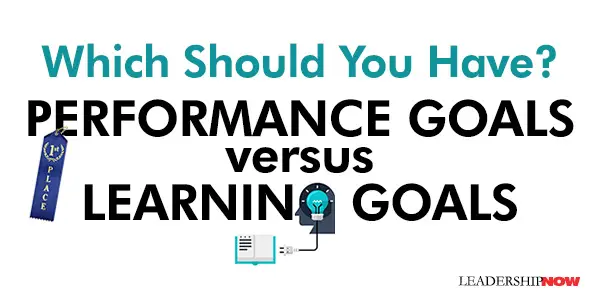 |
 |
12.14.07

Which Should You Have? Performance Goals versus Learning Goals
STANFORD UNIVERSITY psychologist Carol Dweck once made a great distinction between performance goals versus learning goals.
Learning goals are ones that are about increasing your competence. “It reflects a desire to learn new skills, master new tasks, or understand new things—a desire to get smarter.” Both goals she noted are common and can fuel achievement. So there’s nothing wrong with either one. “In fact,” she says, “in the best of all possible worlds, students could achieve both goals at the same time.” Unfortunately, we don’t live in the best of all possible worlds. One is usually pitted against the other. “The tasks that are best for learning are often challenging ones that involve displaying ignorance and risking periods of confusion and errors. The tasks that are best for looking smart are often ones that students are already good at and won’t really learn as much from doing.” What she has found is that an overemphasis on performance goals – wanting to look good – can foster a helpless response. In a 1988 study, they found that “many of the students with performance goals showed a clear helpless pattern in response to difficulty. A number of them condemned their ability, and their problem-solving deteriorated. “In sharp contrast, most of the students with learning goals showed a clear mastery-oriented pattern. In the face of failure, they did not worry about their intellect, they remained focused on the task, and they maintained their effective problem-solving strategies. “When children are focused on measuring themselves from their performance, failure is more likely to provoke a helpless response. When children are instead focused on learning, failure is likely to provoke continued effort.” Another interesting tidbit came out of the study. “Some children were told at the start of the study that they had the ability to do really well at the task. Others were told (temporarily) that their level of ability at the task was not so high. For students with performance goals, this message made a real difference: Students who were certain of their high ability were more likely to hold on in the face of failure and remain mastery-oriented. But students who thought their ability was lower fell right into a helpless response.” It made no difference to the student with learning goals. How are we structuring the environment in our schools and organizations? It seems to me we foster environments that encourage and reward levels of achievement and not degrees of learning. In such a case, most people would opt out for performance goals. Who wants to take a chance of being criticized for looking dumb? Are we learning or looking good? Incidentally, an important book by Carol Dweck has been released in paperback. It covers some of this material. Check out Mindset: The New Psychology of Success. 
Posted by Michael McKinney at 08:59 AM
|
BUILD YOUR KNOWLEDGE
 

How to Do Your Start-Up Right STRAIGHT TALK FOR START-UPS 
Grow Your Leadership Skills NEW AND UPCOMING LEADERSHIP BOOKS 
Leadership Minute BITE-SIZE CONCEPTS YOU CAN CHEW ON 
Classic Leadership Books BOOKS TO READ BEFORE YOU LEAD |